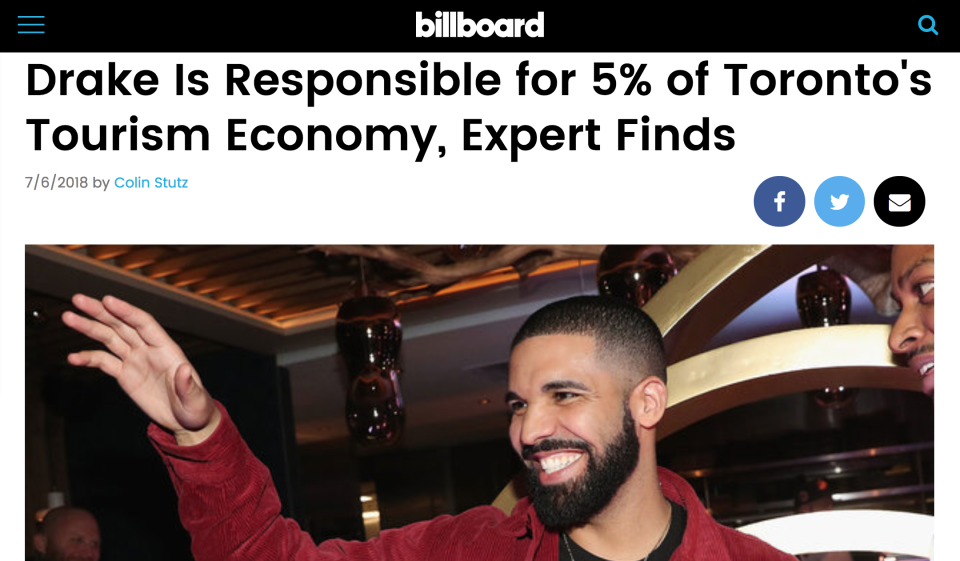No, Drake is not responsible for 5% of Toronto's tourism economy
A branding expert recently told Vice News that Canadian rapper Drake generates about 5% of Toronto’s tourism industry.
“We did some calculations that suggest that he’s worth C$440 million [$333 million] to the Toronto economy,” Gordon Hendren, a marketing and branding consultant who founded Charlton Insights, told Vice. “Why? Because he’s helped to rebrand the city. He’s kind of made himself the same as Toronto.”
Given that the city’s tourism economy is estimated to be about C$8.8 billion ($6.66 billion), the claim turned into the 31-year old Toronto native being responsible for 5% of that. Several hip-hop blogs and a couple of more mainstream publications picked up the detail.

The “Drake effect” included the cool factor that the artist brings to Toronto by calling the city “The 6,” serving as the global ambassador to the Toronto Raptors NBA team, and buying a 40,000-square-foot home in the area. Hendren told Yahoo Finance that Charlton Insights also used Google Trends searches for tourism traffic and YouTube plays to come up with an estimate that, “based on our experience with economic impact studies, we believe [is] reasonable.”
However, experts dispute the quantified conclusion.
“The notion that any individual performer or business can have that big an impact on a city’s economy is a load of crap — or, if you prefer, an urban legend,” Neil DeMause, a veteran editor at the Village Voice and contributor to Fairness and Accuracy In Reporting (FAIR), told Yahoo Finance.
‘Economic impact is a nebulous concept’
There’s no doubting that Drake is on a serious hot streak. Seven songs from his new album, “Scorpion,” are in the top 10 of Billboard’s Hot 100 chart (and all 25 songs make the list).
Nevertheless, the superstar’s impact on the tourism economy in Toronto is a very difficult number to accurately estimate.
“Generally speaking, I would never attribute a single-digit percentage increase in a city, country, or jurisdiction’s economic output to a single individual,” Geoffrey Propheter, assistant professor at the University of Colorado’s School of Public Affairs, told Yahoo Finance.

To measure Drake’s impact, Propheter said, one would have to separate people who would have spent money in Toronto because of Drake from those who would have spent money in Toronto anyway.
In other words, people choosing Drake-affiliated restaurants over non-Drake-affiliated ones doesn’t mean they are adding value to the economy — the choice simply redistributed the income from one party to another.
“Most of the superstar power — particularly in really large cities — is going to be through this redistribution mechanism,” Propheter said. “Economic impact is a nebulous concept. It means different things to different people. It’s measuring economic activity.”
The ‘superstar externality’
That said, Propheter didn’t entirely discount the superstar effect.
He pointed out that the sports world could give us a clue to understanding the “Drake effect,” as studies show that having a superstar generally increases gate revenues.

For example, in 2007, economists did a 9-year study of all the clubs in the first German soccer league to analyze star attraction on ticket sales. They found that superstars, compared to local heroes, enhance attendance both at home and abroad (on top of boosting popularity). Drake is both a superstar and a local hero of sorts.
With the NBA, in 2006, economists found Michael Jordan generated $53 million in broadcast revenue for teams other than his employer and characterized this as a “superstar externality.”
It’s difficult to construct a counterfactual with a city by examining pre- and post-Drake levels of tourism, which would be needed to truly examine his impact on the economy.
“Ideally, what we would like to do in a laboratory, is create the conditions where we hold everything else constant and just change the one thing,” Propheter said. “We can’t create a clone Toronto and then let it function like the real Toronto.”
No denying that Drake is a powerhouse

In any case, Drake’s contribution to Toronto is impressive. And just by looking at a simple measure of income in relation to GDP, the artist’s earning power beats other stars linked to their hometowns.
Drake earned $94 million in 2017, according to Forbes. Toronto’s GDP in 2017 was about C$304 billion ($258 billion), according to the Canadian Trade Commissioner Service. That means that Drake earned about 0.036% of the amount Toronto’s economy itself generated.
For comparison, rapper Eminem earned $11 million in 2016, according to Forbes, while his hometown of Detroit recorded about $252 billion in GDP that year. That’s around 0.004%. And pop icon Prince, a longtime resident of Minneapolis, earned $25 million in pretax income in 2016. The city clocked in $246 billion in 2016. That’s 0.01%.
By this metric, along with the anecdotal evidence, it’s clear that Drake is a special component of the city he calls home. Or, to quote the man himself, “I turn the 6 upside down — it’s a 9 now.”
Read more:
